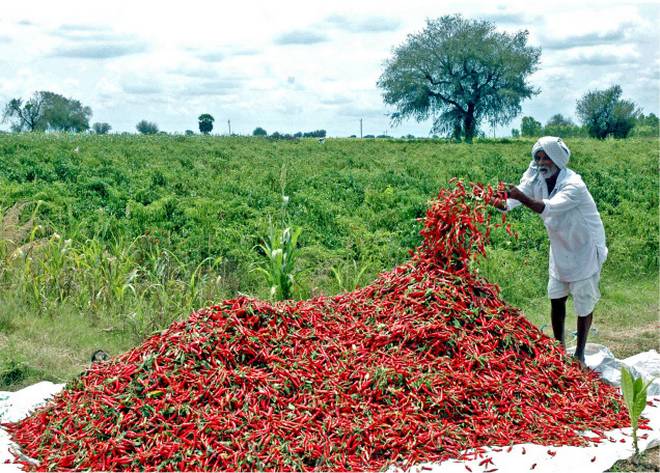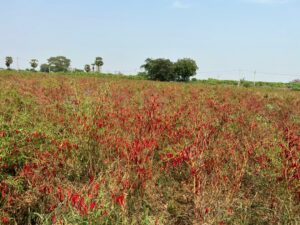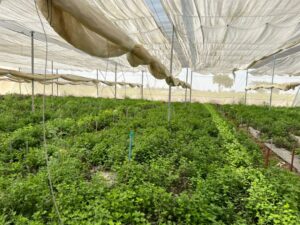To learn more about Digital Green’s AI-powered platform and how it impacts small-scale farmers in India, Ethiopia, Kenya, Nigeria and Nepal, we encourage you to sign up for our newsletter.
Opportunities in using data to strengthen FPOs: DG’s Field Visit to Guntur

During the May cross-country visit, teams from India, the USA, Ethiopia, and Kenya came together to learn more about how we are moving towards making our vision of digitized farmer networks (DFN) a reality. With our field immersion experiences, this was also an opportunity to interact with farmers and key stakeholders and learn more about Digital Green’s work in India.
In Guntur district, Andhra Pradesh, our field visits were divided into two factions – this article focuses on the use of digital data collection tools and chili quality assaying. To read about our digital extension visit, please visit this blog.
 After a warm welcome, the team was introduced to 4 Farmer Producer Organizations, namely – Akulaganapavaram HFPCL, Bellamkonda HFPCL, Palanadu HFPCL, and Sri Lakshmi Chowdeswari HFPCL. One of the most apparent observations to the team was the gender disparity in these FPOs – among the several FPOs present, there was just one woman board member.
After a warm welcome, the team was introduced to 4 Farmer Producer Organizations, namely – Akulaganapavaram HFPCL, Bellamkonda HFPCL, Palanadu HFPCL, and Sri Lakshmi Chowdeswari HFPCL. One of the most apparent observations to the team was the gender disparity in these FPOs – among the several FPOs present, there was just one woman board member.
Chilli crop cultivation has always been male-dominated. Over the years, chili cultivation has also become very input-intensive which also indicates that the risks involved in growing chili crops have increased significantly as well, especially with climate conditions, pest management, etc. In Andhra Pradesh, Digital Green has been sharing targeted advisories with farmers under the E-Mircha Project which works with 10,000 chili farmers in Andhra Pradesh to improve chili production quality and connect them with buyers.
Stakeholders present at the meeting also highlighted various schemes that have been rolled out in the past few years to support FPOs off the ground. This includes providing working capital for assets like offices, furniture, computers, and even CEO’s salary for the initial 3 years. In addition, the Department of Horticulture has supported subsidy schemes that have supported farmers in cultivating high-quality chili crops. There is also a Chilli Polyhouse that is an initiative of the Department of Horticulture and JICA, in which 15000 chili plants were being grown on 1000 acres of land. However, the subsidy that was to be disbursed within 15 days took 15 months which caused serious cash flow problems for the FPO. 
FPOs expressed the need for training on ventures such as primary processing of chillis, bakery, and other food processing units, to forge alternative sources of income. They particularly highlighted that despite the financial and non-financial support that they have received from the government, and private sector, surviving with day-to-day operational costs has been a major challenge.
Samunnati, an open agri network that supports smallholder farmers with agri-commerce and agri-finance solutions, also has a prominent presence in Guntur. They have rolled out many initiatives to support the FPOs in building their financial capacities. During the field meeting, they illustrated how they recruited graduates and diploma holders in agriculture to guide CEOs in preparing financial documentation and support them in the use of the business management software that Samunnati provided free of cost for the initial year of working. Samunnati also has features such as robocalling farmers to provide information on market prices and local weather conditions, and an inventory and sales dashboard.
Mr. Naveen Kumar, a representative from the Department of Horticulture also mentioned the long-standing partnership with Digital Green and how they have utilized community videos to drive change in the farming community. As many farmers in the area are dependent on cash crops, he recognized that DG’s community videos could help shift the focus to horticulture crops so that farmers’ incomes can be diversified, and hence made more resilient to the shocks and drops of the practice.
AgNext, a partner under the E-Mircha Project that supports quality assaying also demonstrated their process of generating a chili quality report which contains information on both physical and chemical parameters. After the collection of samples, chilies are individually placed in a Visio Box to take clear images which are then analyzed using a mobile application. Other tests are also done to assess moisture content, aflatoxin level, etc. If you’re wondering how long this process is, it takes 15 minutes.
DG’s solution, Kisan Diary Enterprise which is an application that supports FPOs with buyer discovery, and aggregation of commodities for sale through transparent data sharing, has also helped these FPOs immensely in demand aggregation and generating a consolidated report of inventory, and predicting the sale amount much in the advance. This solution helped transition from Excel sheets that would need manual inputs to a platform where even extension videos could be uploaded and live-streamed during village meetings which were particularly helpful in combating chili thrips last year.
Altogether, this was an insightful visit for Digital Green as we navigate the opportunities of the new strategy. What stands out is the prominent role that DG can play in strengthening the capacities of FPOs and their various stakeholders by making their business processes more structured using business plans, defined roles, and governing bodies that divide and distribute roles including data collection, data entry, sale of inputs, inventory management, etc.
Recognizing the requirement of capital, DG’s solution, KDE could also be developed further to have a more elaborate buyer interface that focuses on market linkages to be more beneficial to the FPOs. Their cash flow suffers mainly due to delayed payments and difficult-to-get subsidies. Moreover, there is also a scope of integrating data required by the various platforms that FPOs use through the data wallets and data visualizations to give an upper hand to FPOs in negotiations during the sale of produce. Since chili is an all-out male-dominated commodity, especially in production and marketing, there is also scope for involving women farmers in the processing. DG can facilitate video dissemination on primary and secondary processing of chilies to achieve this.